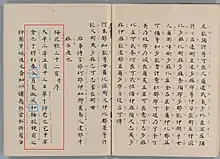令和
| ||||||||
Chinese
make or cause to be; order; command make or cause to be; order; command; decree; honorable | mix together; peace; harmony mix together; peace; harmony; and; with; union; cap (a poem); respond in singing; soft; warm | ||
|---|---|---|---|
| trad. (令和) | 令 | 和 | |
| simp. #(令和) | 令 | 和 | |
Etymology
From Japanese 令和 (Reiwa).
Pronunciation
Proper noun
令和
- Reiwa era of Japanese history
Japanese
| Kanji in this term | |
|---|---|
| 令 | 和 |
| れい Grade: 4 | わ Grade: 3 |
| kan’on | goon |
| Alternative spellings |
|---|
| ㋿ R (abbreviation) |

Etymology
From the Literary Chinese foreword by Ōtomo no Tabito to poems 815-846 in the fifth book of the Man'yōshū (c. 759 CE). Relevant part of the foreword:
- 于時、初春令月、氣淑風和、梅披鏡前之粉、蘭薫珮後之香。
- It was in new spring, in a fair month,
When the air was clear and the wind a gentle breeze.
Plum flowers blossomed a beauty's charming white
And the fragrance of the orchids was their sweet perfume.
- It was in new spring, in a fair month,
The Man'yōshū passage alludes in turn to a rhapsody written in 138 CE by the Han polymath and statesman Zhang Heng, titled 歸田賦 (Guītián Fù, “Return to the Field”).[1] Below is the relevant part of the rhapsody with translation by Liu Wu-chi (1990), with slightly different choices of English for the same Chinese words:
- 於是仲春令月,時和氣清;原隰鬱茂,百草滋榮。 [Classical Chinese, trad.]
- From: Return to the Field, by Zhang Heng, 138 CE
- Yúshì zhòng chūn lìngyuè, shí hé qì qīng; yuán xí yù mào, bǎicǎo zī róng. [Pinyin]
- Then comes young spring, in a fine month,
When the wind is mild and the air clear.
Plains and swamps are overgrown with verdure
And the hundred grasses become rank and thick.
于是仲春令月,时和气清;原隰郁茂,百草滋荣。 [Classical Chinese, simp.]
With reference to both contexts, a general understanding of this kanji compound is thus along the lines of "good harmony", though it should be noted that this sense of "good" of the common character 令 (rei) is otherwise very rare.
Pronunciation
- (Tokyo) れーわ [réꜜèwà] (Atamadaka – [1])
- (Tokyo) れーわ [rèéwá] (Heiban – [0])
- IPA(key): [ɾe̞ːɰᵝa̠]
Audio (file)
Proper noun
令和 • (Reiwa)
- the Reiwa period (Japanese era that began on 1 May 2019)
Descendants
- → English: Reiwa
- → Chinese:
- Mandarin: 令和 (Lìnghé)
- → Korean: 레이와 (Reiwa)
- → Vietnamese: Reiwa, Lệnh Hoà, Lệnh Hòa
See also
- 平成 (Heisei): era that preceded the Reiwa era
References
- Akihiro Sadake; Hideo Yamada; Isao Kudo; Masao Otani; Yoshiyuki Yamazaki (10 November 2017), “Man'yōshū, part 1”, in Shin Nihon Koten Bungaku Taikei [The New Compendium of Classical Japanese Literature] (in Japanese), Tōkyō: Iwanami Shoten, →ISBN
Vietnamese
| Hán tự in this term | |
|---|---|
| 令 | 和 |
Proper noun
令和
- chữ Hán form of Lệnh Hoà, Lệnh Hòa (“Reiwa era of Japanese history”).